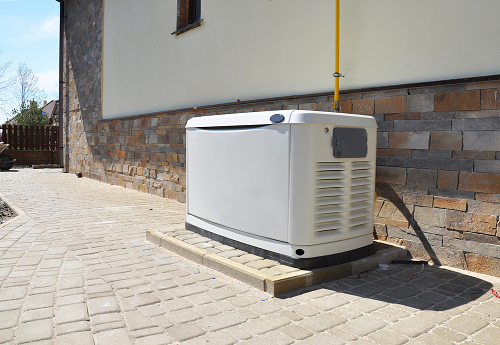Backup generators can be a good part of any power outage preparedness plan. That’s doubly true for customers of California’s PG&E, including those in the North Bay area, who can expect up to 10 years of widespread forced shut-offs from the utility giant. The program is designed to prevent power transmissions lines from sparking fires, but it also means many home and business owners will be forced to go without power.
Along with storms, falling trees, and flash flooding, all of which can cause power outages, the new PG&E initiative makes investing in a backup generator for your home or business a smart idea.
What is a Backup Generator?

Often your first and best line of defense against the inconveniences and damages a power outage can bring, a backup generator provides electricity, heat, and light until the power is turned back on or restored. From flooded basements to spoiled food and downed computer systems, backup generators provide the temporary power you need to keep equipment and appliances operating as normal.
Generators come in a range of sizes and budgets and, even if your home or business is never affected by a scheduled outage, can be a powerful source of protection in the case of an emergency. High power demand, downed trees, and utility pole collisions can all contribute to power outages that may last for hours, days, and sometimes weeks.
How Does a Backup Generator Work?
Most backup generators are powered by either natural gas or propane (business models also use diesel) and have two main components:
- The standby generator unit.
- An automated transfer switching system.
Together they ensure a constant uninterrupted flow of electrical power delivered to your home or business. There are two types of backup generators:
- Portable versions are fairly noisy and tend to give off an unpleasant odor. They’re the right choice for people interested in an inexpensive solution for those times when the lights or other equipment that doesn’t have a plug go out. To prevent carbon monoxide poisoning, these units must be kept a good distance from a building or house. They should not be operated in wet or rainy conditions and require a dry surface and canopy-like covering.
- Permanent models are, in our opinion, the best investment for the simple reason they supply a greater amount of power than portable ones do and are designed to keep your home or business fully powered for days when an outage occurs.
What Type of Generator Do You Need?
Homeowners may want to consider a whole-house generator. Permanently connected to your home, these generators automatically turn on when the utility power supply is interrupted. Though not inexpensive, it only takes one time for it to kick into action for you to appreciate the purchase. Permanent whole-house generators should always be professionally installed by a qualified contractor.
For business owners, the expense of installing a generator is far outweighed by the benefits it brings, as even one day of downtime can be financially devastating.
Learn More
Ready to move forward with a backup generator for your Sebastopol, Santa Rosa, or North Bay area home or business? Spyrka Electric has installed countless backup generators for your neighbors and would love to do the same for you! To learn more about backup generators in general as well as our local, family-owned, full-service electrical services company, contact us by phone, email, or online.

